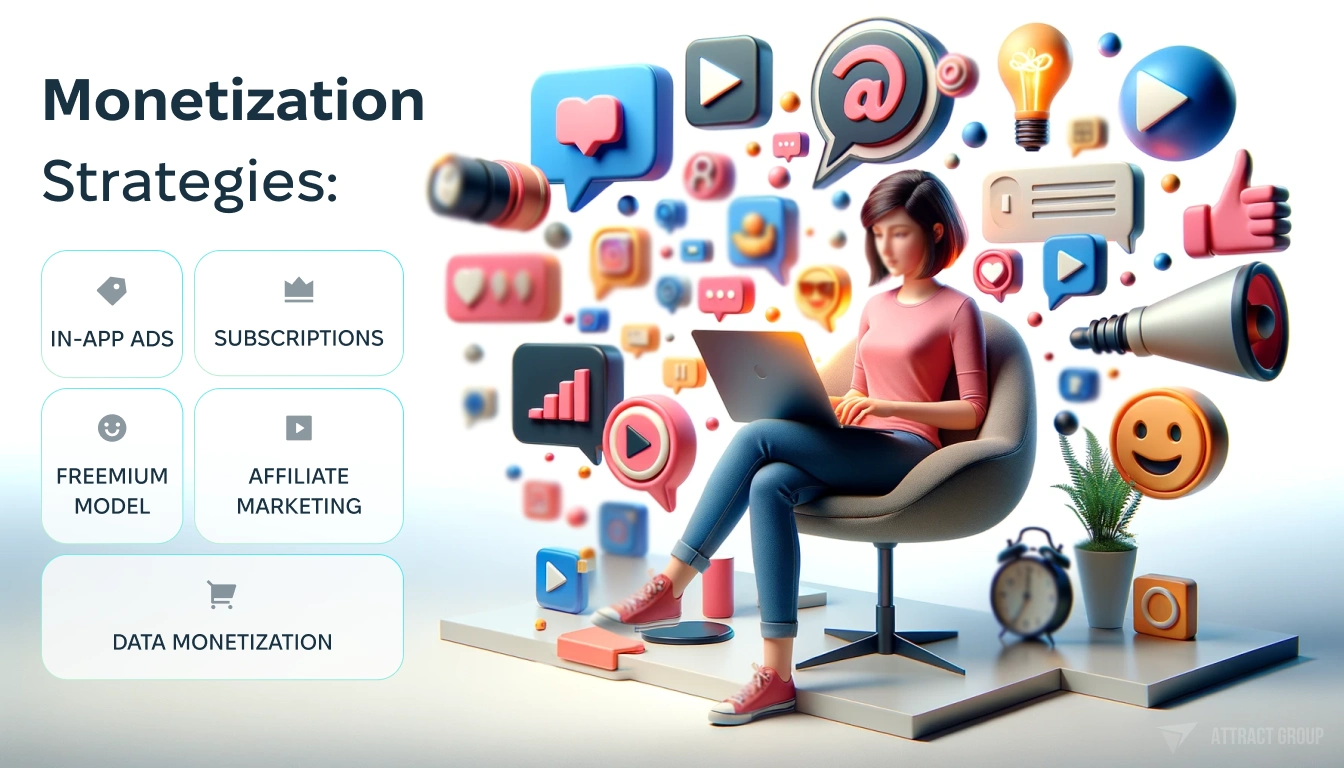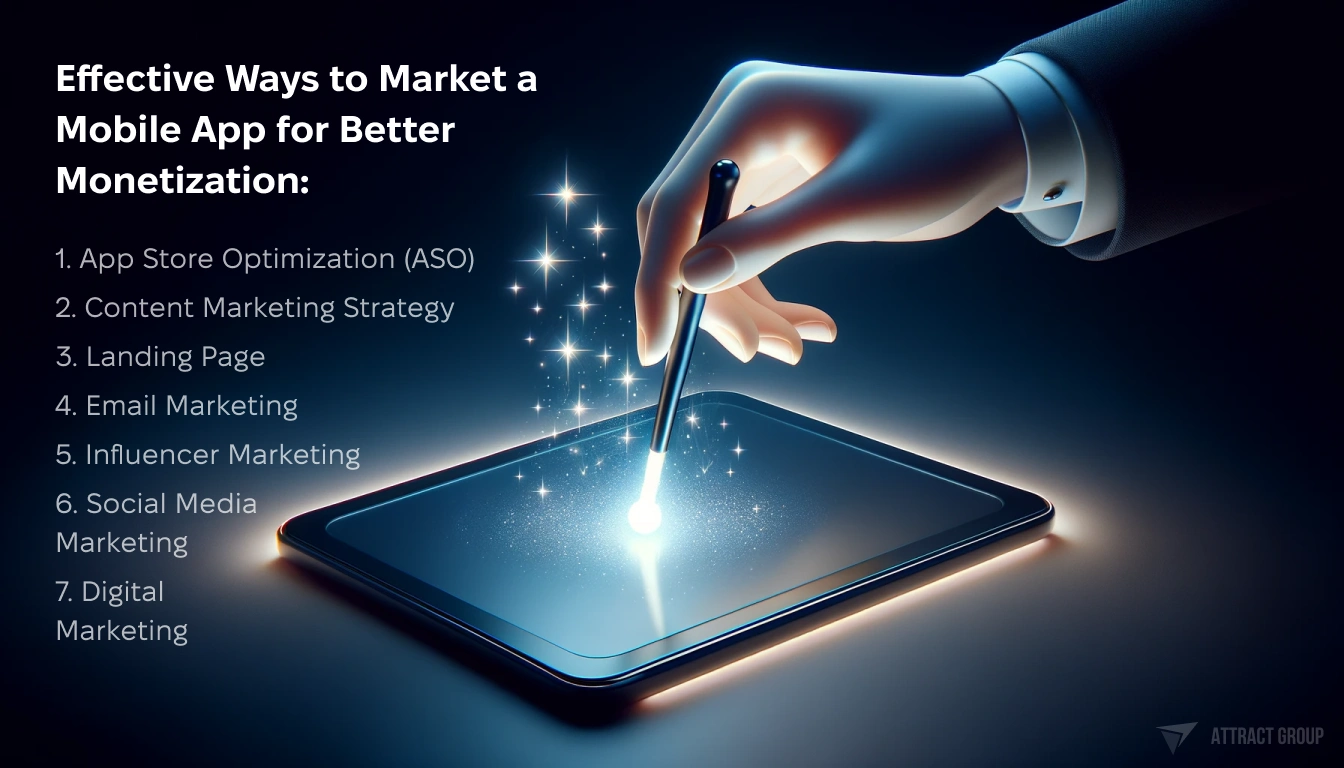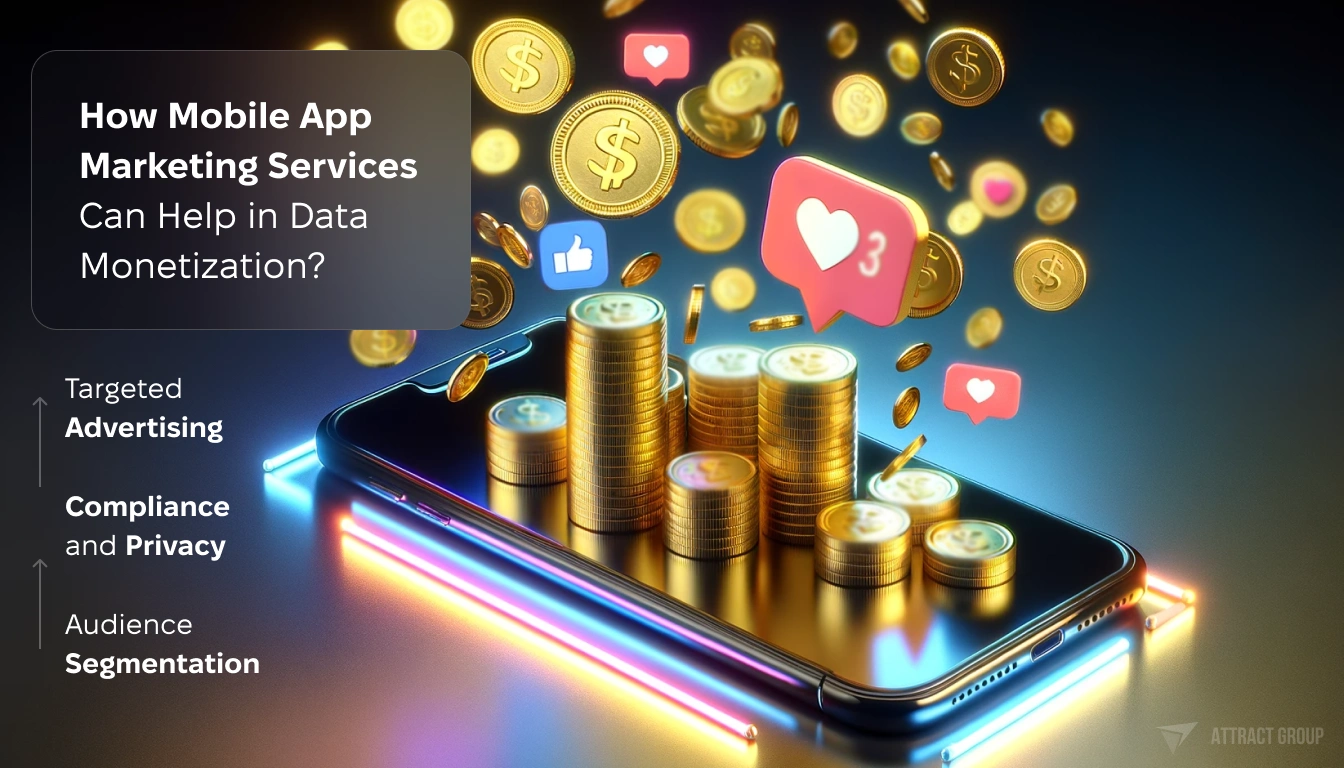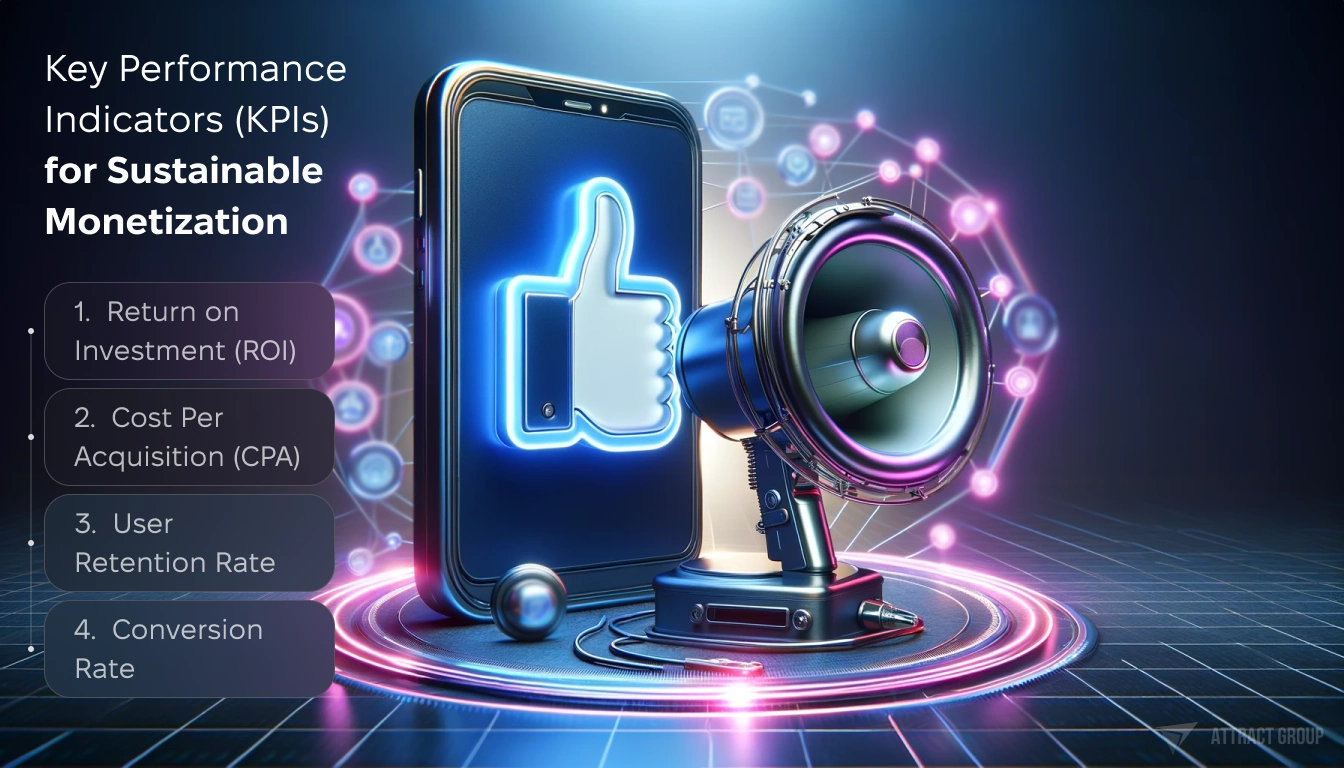Advanced Mobile App Marketing Strategies for Monetization: Maximizing Revenue
 17 December 2023
17 December 2023Mobile apps have become a cornerstone in our digital era, offering diverse functionalities from staying connected to enhancing productivity. With this growth comes a crucial need for effective mobile app marketing strategies to ensure profitability.
This guide focuses on innovative mobile app marketing strategies, catering to both seasoned developers and those new to the app world. We’ll explore how to effectively position your app in the market and optimize its revenue potential.
Here, you’ll find essential insights and actionable tips to navigate the competitive app world, using strategic marketing to your advantage. Let’s explore the world of mobile app marketing and unlock the secrets to monetizing your app effectively.
The Importance of Monetization and Marketing in the Mobile App Landscape
- Digital Transformation: Mobile apps have undergone a revolution, ushering in the digital age’s transformation. They’ve transcended mere convenience to become essential tools for communication, productivity, entertainment, and commerce.
- Thriving Marketplace: The app market has evolved into a thriving marketplace, teeming with opportunities for both established developers and newcomers.
- Monetization-Marketing Nexus: Monetization and marketing are the twin engines that propel your app’s success. Monetization transforms your app into a revenue source, while marketing acts as the guiding light that leads users to your app.
Multi-Faceted Approach to Monetize Your Mobile App
Monetization Strategies
- In-App Ads: Displaying advertisements within your app can generate revenue through clicks and impressions.
- Subscriptions: Offer users premium content or features in exchange for a subscription fee.
- In-App Purchases: Allow users to buy virtual goods or upgrades within your app.
- Freemium Model: Provide a free basic version of your app with the option to unlock advanced features through purchases.
- Affiliate Marketing: Partner with other businesses to promote their products or services within your app and earn commissions.
- Data Monetization: Leverage user data to gain insights and monetize through targeted advertising or selling data.

The Synergy Between Monetization and Marketing
In the world of mobile app development, monetization and marketing go hand in hand. Let’s explore how marketing strategies can amplify your monetization efforts and why mobile app marketing is crucial for revenue generation.
How Marketing Strategies Can Amplify Monetization Efforts
Marketing strategies create opportunities for monetization:
- Broad Audience Reach: Effective marketing exposes your app to a larger audience, increasing the chances of downloads and interactions.
- User Engagement: Engaged users are more likely to make in-app purchases or interact with advertisements, contributing to revenue.
- Enhanced Visibility: Marketing ensures your app remains visible in a crowded marketplace, attracting new users regularly.
Don’t wait—take action today to unleash the full potential of your app
The Role of Mobile App Marketing in Revenue Generation
Beyond Downloads
- User Acquisition: Marketing is not just about getting users to download your app; it’s about attracting users who will actively engage with it.
- User Engagement: Marketing strategies foster engagement, which is crucial for user retention and repeated revenue generation.
- Active Ecosystem: A thriving ecosystem of engaged users provides ongoing revenue opportunities.
Key Functions of Mobile App Marketing
- User Acquisition: Attracting new users through various channels like social media, advertising, and content marketing.
- User Engagement: Keeping users interested and active within the app through notifications, personalized content, and incentives.
- User Retention: Strategies to retain users and prevent churn, such as loyalty programs and regular updates.
- Monetization Promotion: Marketing efforts to encourage in-app purchases, subscriptions, or engagement with advertisements.
Marketing a Mobile App for Monetization
Now that we understand the synergy between monetization and marketing, let’s explore effective ways to market a mobile app to maximize monetization.
Effective Ways to Market a Mobile App for Better Monetization
- App Store Optimization (ASO): Optimizing your app’s visibility in app stores is crucial. This includes using relevant keywords, creating an engaging app icon and screenshots, and encouraging positive reviews.
- Content Marketing Strategy: Develop valuable content that educates and entertains your target audience. This can include blog posts, videos, and social media updates that showcase the benefits of your app.
- Landing Page: Create a dedicated landing page for your app with compelling visuals and a clear call to action for downloading the app.
- Email Marketing: Utilize email marketing campaigns to keep users engaged and informed about app updates, promotions, and new features.
- Influencer Marketing: Collaborate with influencers who align with your app’s target audience. Their endorsements can have a significant impact on user acquisition.
- Social Media Marketing: Leverage popular social media platforms to create a strong online presence. Engage with your audience through regular posts and interactions.
- Digital Marketing: Invest in paid advertising campaigns on platforms like Google Ads and Facebook Ads to reach a broader audience.

These marketing strategies lay the foundation for successful monetization, but the real magic happens when you combine them with various monetization models. Let’s delve into some of these models and see how mobile app marketers can make the most of them.
In-App Advertising and Marketing Mobile Apps
In-app advertising is a popular monetization method, and effective marketing can boost ad revenue significantly. Let’s explore the types of in-app ads and best practices in mobile app marketing for ad placements.
Types of In-App Ads
In-app ads come in various formats, including banner ads, interstitial ads, native ads, and video ads. Each type has its own strengths and can be leveraged for different purposes.
- Banner Ads: These are small, rectangular ads that appear at the top or bottom of the screen. They are unobtrusive and can be used to display promotions or offers.
- Interstitial Ads: These are full-screen ads that appear between different sections of your app, such as during transitions or after completing a level in a game.
- Native Ads: Native ads seamlessly blend into the app’s content, making them less intrusive and more engaging for users.
- Video Ads: Video ads can be highly engaging when used correctly. They can appear as pre-roll or rewarded videos, where users watch a video in exchange for in-app rewards.
Best Practices in Mobile App Marketing for Ad Placements
- Targeted Advertising: Use user data and behavior analysis to display ads that are relevant to each user. This increases the chances of ad clicks and conversions.
- Frequency Capping: Don’t overwhelm users with too many ads. Implement frequency capping to control the number of times a user sees an ad.
- A/B Testing: Experiment with different ad placements and formats to determine what works best for your audience.
- Optimize Loading Times: Ensure that ads load quickly to prevent users from abandoning your app.
- User-Friendly Ad Design: Create visually appealing ads that match the look and feel of your app to provide a seamless user experience.
| Monetization Model | Impact of Marketing Strategies |
|---|---|
| In-App Advertising | Boosts ad revenue through targeted ads, A/B testing, and user-friendly ad design. |
| Freemium Model | Attracts more users with effective marketing and provides opportunities for upselling and cross-selling. |
| In-App Purchases | Encourages users to make purchases through marketing campaigns highlighting the value of in-app items. |
| Affiliate Marketing | Expands the user base by leveraging affiliate partnerships and tracking performance. |
| Subscription Model | Increases subscription sign-ups with well-crafted marketing strategies and KPI measurement. |
| Data Monetization | Utilizes mobile app marketing services to maximize data monetization while adhering to ethical standards. |
These monetization models are not mutually exclusive. Many successful apps use a combination of these strategies to diversify their revenue streams. In the next sections, we will delve deeper into each model, exploring how mobile app marketing can drive monetization.
Freemium Model and Mobile App Marketers
The freemium model is a popular choice among app developers. It allows users to download the app for free, with the option to purchase premium features or content. Let’s examine how mobile app marketers can leverage the freemium model for monetization.
To learn the basic about Fremium Model, Watch this youtube video:
How Mobile App Marketers Can Leverage the Freemium Model
- Attracting a Wider Audience: By offering a free version of your app, you can attract a larger user base. This is where marketing comes into play. Use targeted advertising and promotions to reach potential users.
- Upselling and Cross-Selling: Mobile app marketers can create campaigns that encourage users to upgrade to the premium version of the app or purchase additional content. Highlight the benefits of premium features.
- Engaging Content: Marketing efforts should focus on showcasing the value of premium content or features. Use storytelling and visuals to illustrate how users can benefit from the paid offerings.
Strategies for Upselling and Cross-Selling Within the App
- In-App Notifications: Send personalized notifications to users, highlighting the advantages of upgrading to the premium version.
- Limited-Time Offers: Create urgency by offering time-limited discounts or promotions for premium features.
- Content Teasers: Allow users to experience a taste of premium content for free, enticing them to unlock the full experience.

In-App Purchases and Mobile Apps Marketing
In-app purchases (IAPs) are a direct source of revenue for many mobile apps. Effective marketing can significantly impact the conversion rate of users making in-app purchases. Let’s explore how to market in-app purchases for maximum conversions and the role of mobile app marketing in promoting them.
How to Market In-App Purchases for Maximum Conversions
- Clear Descriptions: Provide concise and compelling descriptions of in-app items to app user, emphasizing their benefits and how they enhance the user experience.
- Bundle Deals: Create bundles of in-app items at a discounted price, encouraging users to make larger purchases.
- Limited-Time Offers: Generate a sense of urgency with limited-time discounts or exclusive offers for in-app purchases.
- User Feedback: Showcase positive reviews and testimonials from users who have made in-app purchases.
Role of Mobile Apps Marketing in Promoting In-App Purchases
Mobile app marketing plays a pivotal role in promoting in-app purchases by creating awareness and interest in these offerings. It’s essential to implement targeted marketing campaigns that reach users at the right moment in their user journey.
Affiliate Marketing and Mobile Apps
Affiliate marketing is a powerful strategy that allows app developers to generate additional revenue by partnering with affiliates who promote their app. Let’s delve into how you can use affiliate marketing mobile apps effectively and tips for selecting affiliate partners and tracking performance.
Using Affiliate Marketing Mobile Apps to Generate Additional Revenue
- Affiliate Networks: Join affiliate networks that specialize in mobile apps. These networks connect app developers with affiliates who have expertise in app promotion.
- Affiliate Marketing Platforms: Consider using affiliate marketing platforms or plugins that seamlessly integrate with your app, making it easy for affiliates to promote your app.
- Performance Tracking: Implement robust tracking mechanisms to monitor the performance of your affiliates. Use affiliate marketing tools that provide insights into clicks, conversions, and revenue generated by each affiliate.
Tips for Selecting Affiliate Partners and Tracking Performance
- Relevance: Choose affiliates whose audience aligns with your app’s target audience. This ensures that the promotion reaches potential users who are likely to engage with your app.
- Quality Over Quantity: Focus on quality affiliates who have a genuine following and influence in your app’s niche. A smaller number of high-quality affiliates can yield better results than a large number of low-quality ones.
- Transparent Compensation: Clearly define the compensation structure for affiliates. Whether it’s a commission-based model or a fixed fee, transparency builds trust with affiliates.
Top 3 Mobile App Marketing Agencies that Specialize in Monetization Strategies
| Agency Name | Services Offered | Website |
|---|---|---|
| AdMob by Google | In-App Advertising, AdMob Mediation | Visit website |
| Chartboost | In-App Advertising, Mediation, User Acquisition | Visit website |
| Tapjoy | Mobile Advertising, User Engagement | Visit website |
Affiliate marketing can be a lucrative strategy when executed effectively. It extends your app’s reach and allows you to tap into new user segments.
Subscription Model and Mobile App Marketing Strategy
Subscriptions have gained popularity as a reliable source of recurring revenue for mobile apps. Crafting an effective mobile app marketing strategy for subscription models is crucial. Let’s explore how to do it and the key performance indicators (KPIs) to measure the success of your subscription strategy.
Crafting a Mobile App Marketing Strategy for Subscription Models
- Value Proposition: Clearly communicate the value users will receive through a subscription. Highlight exclusive content, features, or benefits.
- Trial Periods: Offer free trial periods to allow users to experience the premium features before committing to a subscription.
- Tiered Pricing: Implement tiered pricing models that cater to different user segments. Some users may prefer a basic plan, while others may opt for a premium subscription.
KPIs to Measure the Success of Your Subscription Strategy
- Subscription Conversion Rate: Measure the percentage of users who convert from free to paid subscriptions.
- Churn Rate: Keep an eye on the churn rate, which indicates how many subscribers cancel their subscriptions. High churn rates can signal a need for improvements.
- Average Revenue Per User (ARPU): Calculate the average revenue generated from each subscriber. This helps assess the overall financial health of your subscription model.
- Customer Lifetime Value (CLV): Determine the CLV to understand the long-term value of each subscriber. This metric can guide your marketing efforts.
Data Monetization and Mobile App Marketing Services
Data monetization is a valuable strategy for app developers, but it comes with ethical considerations and the need for compliance. Let’s explore how mobile app marketing services can help in data monetization while ensuring ethical practices are followed.
How Mobile App Marketing Services Can Help in Data Monetization
- Audience Segmentation: Mobile app marketing services can assist in segmenting your user base based on their preferences and behaviors. This data can be valuable to advertisers.
- Targeted Advertising: Leveraging user data, mobile app marketing services can implement targeted advertising campaigns that resonate with specific user segments.
- Compliance and Privacy: Ensure that the data monetization strategies comply with data privacy regulations and respect users’ privacy rights. Transparency in data collection and usage is paramount.

Ethical Considerations and Compliance in Data Monetization
- User Consent: Obtain explicit user consent for data collection and usage. Clearly communicate how the data will be utilized and provide users with the option to opt out.
- Data Anonymization: Implement techniques to anonymize and protect user data. This ensures that personally identifiable information is safeguarded.
- Data Security: Invest in robust data security measures to prevent unauthorized access or breaches that could compromise user data.
Mobile app marketing services can play a pivotal role in navigating the complexities of data monetization while maintaining ethical standards.
Mobile App Marketing Campaigns for Monetization
Planning and executing well-crafted marketing campaigns are essential for monetizing your mobile app effectively. Let’s explore how to plan and execute Mobile App Marketing and Monetization campaigns that drive revenue.
Planning and Executing Mobile App Marketing Campaigns for Monetization
- Identify Goals: Clearly define the objectives of your marketing campaign. Whether it’s increasing user acquisition, boosting in-app purchases, or promoting subscriptions, having specific goals is crucial.
- Target Audience: Understand your target audience’s preferences and behaviors. Tailor your campaign to resonate with their needs and interests.
- Budget Allocation: Allocate your marketing budget strategically, focusing on channels and strategies that align with your goals.
- Content Creation: Develop compelling content that communicates the value of your app’s offerings. Use visuals, videos, and persuasive copywriting to engage users.
- Timing: Timing is crucial. Schedule your campaigns to coincide with events, holidays, or seasonal trends that are relevant to your app.
- Testing and Optimization: Continuously monitor the performance of your campaigns. A/B testing can help refine your approach and improve conversion rates.
- User Feedback: Listen to user feedback and adapt your campaigns accordingly. Address concerns and provide solutions promptly.
Measuring Success: Mobile App Marketing Trends and Best Practices
Success in mobile app marketing for monetization is an ongoing journey. To ensure sustainable growth, it’s essential to keep a close eye on key performance indicators (KPIs) and stay updated with the latest mobile app marketing trends and best practices.
Key Performance Indicators (KPIs) for Sustainable Monetization
- Return on Investment (ROI): Calculate the ROI of your marketing efforts by measuring the revenue generated against the marketing expenses.
- Cost Per Acquisition (CPA): Evaluate the cost of acquiring each new user through your marketing campaigns. Lowering CPA can increase profitability.
- User Retention Rate: Measure how well your marketing campaigns retain existing users. High user retention indicates the long-term success of your app.
- Conversion Rate: Track the conversion rates at different stages of your user journey. This helps identify areas for improvement.

Mobile App Marketing Best Practices for Sustainable Monetization
- Personalization: Implement personalization strategies that tailor marketing messages to individual user preferences and behaviors.
- User Engagement: Focus on strategies that enhance user engagement within the app. Engaged users are more likely to make in-app purchases and subscribe.
- User Experience: Continuously improve the user experience to reduce churn rates and boost user satisfaction.
- Data-Driven Decisions: Base your marketing decisions on data and analytics. Data-driven insights lead to more effective strategies.
- Adaptability: Stay adaptable and be ready to pivot your marketing strategies based on changing market conditions and user preferences.
Conclusion
In conclusion, the world of mobile app marketing is dynamic and ever-evolving. Maximizing revenue through effective marketing strategies requires a deep understanding of your app’s monetization models and the needs of your target audience.
By synergizing monetization and marketing, you can create a sustainable ecosystem where your app thrives, and users actively engage with your offerings. As you explore the various monetization models, remember that a multi-faceted approach can provide the best results.

The mobile app market offers tremendous opportunities, but success depends on your ability to connect with users, showcase the value to use your app, and ethically monetize your offerings. Keep a close eye on KPIs, stay updated with industry trends, and adapt your strategies as needed to achieve lasting success.
If you have more specific questions or need tailored advice for your mobile app, feel free to reach out to our experts at Attract Group
FAQs:
Here are some frequently asked questions related to mobile app monetization and marketing. If you have queries or need further insights, you’ll likely find the answers below:
1. What is the significance of mobile app marketing?
Mobile app marketing is crucial for several reasons. It helps you reach a wider audience, acquire new users, and retain existing ones. Effective marketing strategies can boost your app’s visibility, drive downloads, and ultimately generate revenue through various monetization models.
2. How can I create a successful marketing plan for my mobile app?
To create a successful marketing plan, start by defining your goals and target audience. Then, allocate your budget strategically, create engaging content, and consider timing, testing, and user feedback. Adaptability and data-driven decision-making are also essential for a successful plan.
3. What are some best practices for marketing a mobile app?
Some best practices for marketing a mobile app include personalization, user engagement strategies, improving user experience, making data-driven decisions, and staying adaptable to changing market conditions. These practices can help you effectively promote your app and drive monetization.
4. Can you explain the concept of app store optimization (ASO)?
App Store Optimization (ASO) is the process of optimizing your app’s listing in app stores like Apple’s App Store and Google Play. It involves using relevant keywords, optimizing visuals and descriptions, and getting user reviews to improve your app’s visibility and rankings in search results.
5. What are some popular monetization models for mobile apps?
Popular monetization models for mobile apps include in-app advertising, in-app purchases, subscription models, and data monetization. Each model offers unique ways to generate revenue, and choosing the right one depends on your app’s niche and target audience.
6. How can I ensure ethical data monetization in my mobile app?
Ethical data monetization involves obtaining user consent for data collection, anonymizing and securing user data, and complying with privacy regulations. It’s essential to be transparent with users about data usage and prioritize their privacy rights.
7. What are the key performance indicators (KPIs) for measuring mobile app marketing success?
Key performance indicators for measuring mobile app marketing success include Return on Investment (ROI), Cost Per Acquisition (CPA), user retention rate, and conversion rate. Monitoring these metrics helps assess the effectiveness of your marketing efforts.
8. Are there specialized agencies that can help with mobile app marketing and monetization strategies?
Yes, several specialized agencies offer services for mobile app marketing and monetization strategies. Some top agencies specialize in ad mediation, user acquisition, and optimizing monetization efforts. You can explore agencies like AppMonetize, AdMob by Google, Chartboost, Tapjoy, and IronSource.
9. How can I stay updated with the latest mobile app marketing trends and best practices?
To stay updated with the latest trends and best practices in mobile app marketing, consider subscribing to comprehensive guides and blogs in the field. Websites like Attract Group provide valuable insights and up-to-date information on mobile app marketing and development.
10. What steps can I take to make my mobile app stand out in a competitive market?
To make your mobile app stand out in a competitive market, focus on user-centricity, innovation, and effective marketing. Understand your target audience, provide a seamless user experience, and implement personalized marketing strategies. Continuously monitor your app’s performance and adapt your strategies as needed to stay ahead.










